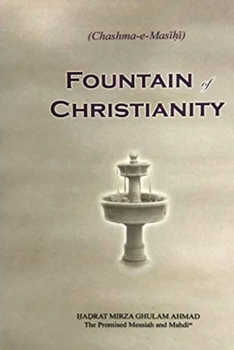Fountain of Christianity
Hadrat Mirza Ghulam Ahmad, the Promised Messiahas
and Mahdi, wrote Fountain of Christianity in March 1906,
in response to a book written by a Christian, in which the
gentleman tried to prove that the Holy Quran does not
contain any new teachings and that the Holy Prophetsa
merely copied the narratives from past scriptures-God
forbid. The Promised Messiahas responds to this objection
by, first, raising serious doubts about the authenticity of
the Christian Gospels, and then goes on to show how the
Holy Quran is a unique and peerless book, how so many
of its prophecies have been fulfilled, and how its blessings
live on to this day.
In this small book, the author also argues against the doctrines
of Trinity and Atonement held by Christians, and
shows that these beliefs have nothing to do with the teachings
of Jesus himself. In this context, the Promised
Messiahas also draws out a comparison between the Muslim
and Christian teachings of forgiveness and punishment.
The second part of the book, or Epilogue, consists of a profound
thesis on the nature of true salvation. The Promised
Messiahas describes salvation as "The abiding peace and
happiness which man, by his very nature, hungers and
thirsts for, and which is achieved through personal love
and recognition of God, and through a perfect relationship
with Him." The Promised Messiahas shows that the Christian
and Hindu doctrines of salvation have not only failed
in this purpose, but are also contrary to the eternal laws
and attributes of the Almighty God.





